It’s that time of year to release our best selling top business book list full of must-reads for entrepreneurs and business owners. This list is from the top authors this year in small business, personal development, entrepreneurship, and other non-fiction categories.
1. Steve Jobs – Walter Isaacson
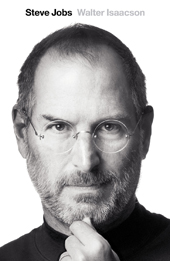 Based on more than forty interviews with Jobs conducted over two years—as well as interviews with more than a hundred family members, friends, adversaries, competitors, and colleagues—Walter Isaacson has written a riveting story of the roller-coaster life and searingly intense personality of a creative entrepreneur whose passion for perfection and ferocious drive revolutionized six industries: personal computers, animated movies, music, phones, tablet computing, and digital publishing.
Based on more than forty interviews with Jobs conducted over two years—as well as interviews with more than a hundred family members, friends, adversaries, competitors, and colleagues—Walter Isaacson has written a riveting story of the roller-coaster life and searingly intense personality of a creative entrepreneur whose passion for perfection and ferocious drive revolutionized six industries: personal computers, animated movies, music, phones, tablet computing, and digital publishing.
At a time when America is seeking ways to sustain its innovative edge, and when societies around the world are trying to build digital-age economies, Jobs stands as the ultimate icon of inventiveness and applied imagination. He knew that the best way to create value in the twenty-first century was to connect creativity with technology. He built a company where leaps of the imagination were combined with remarkable feats of engineering.
Although Jobs cooperated with this book, he asked for no control over what was written nor even the right to read it before it was published. He put nothing off-limits. He encouraged the people he knew to speak honestly. And Jobs speaks candidly, sometimes brutally so, about the people he worked with and competed against. His friends, foes, and colleagues provide an unvarnished view of the passions, perfectionism, obsessions, artistry, devilry, and compulsion for control that shaped his approach to business and the innovative products that resulted.
2. The Lean Startup: How Today’s Entrepreneurs Use Continuous Innovation to Create Radically Successful Businesses – Eric Ries
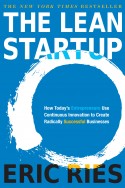 Most startups fail. But many of those failures are preventable. The Lean Startup is a new approach being adopted across the globe, changing the way companies are built and new products are launched.
Most startups fail. But many of those failures are preventable. The Lean Startup is a new approach being adopted across the globe, changing the way companies are built and new products are launched.
Eric Ries defines a startup as an organization dedicated to creating something new under conditions of extreme uncertainty. This is just as true for one person in a garage or a group of seasoned professionals in a Fortune 500 boardroom. What they have in common is a mission to penetrate that fog of uncertainty to discover a successful path to a sustainable business.
The Lean Startup approach fosters companies that are both more capital efficient and that leverage human creativity more effectively. Inspired by lessons from lean manufacturing, it relies on “validated learning,” rapid scientific experimentation, as well as a number of counter-intuitive practices that shorten product development cycles, measure actual progress without resorting to vanity metrics, and learn what customers really want. It enables a company to shift directions with agility, altering plans inch by inch, minute by minute.
Rather than wasting time creating elaborate business plans, The Lean Startup offers entrepreneurs – in companies of all sizes – a way to test their vision continuously, to adapt and adjust before it’s too late. Ries provides a scientific approach to creating and managing successful startups in a age when companies need to innovate more than ever.
3. Thinking, Fast and Slow – Daniel Kahneman
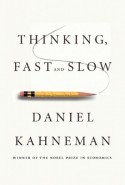 In the highly anticipated Thinking, Fast and Slow, Kahneman takes us on a groundbreaking tour of the mind and explains the two systems that drive the way we think. System 1 is fast, intuitive, and emotional; System 2 is slower, more deliberative, and more logical. Kahneman exposes the extraordinary capabilities—and also the faults and biases—of fast thinking, and reveals the pervasive influence of intuitive impressions on our thoughts and behavior. The impact of loss aversion and overconfidence on corporate strategies, the difficulties of predicting what will make us happy in the future, the challenges of properly framing risks at work and at home, the profound effect of cognitive biases on everything from playing the stock market to planning the next vacation—each of these can be understood only by knowing how the two systems work together to shape our judgments and decisions.
In the highly anticipated Thinking, Fast and Slow, Kahneman takes us on a groundbreaking tour of the mind and explains the two systems that drive the way we think. System 1 is fast, intuitive, and emotional; System 2 is slower, more deliberative, and more logical. Kahneman exposes the extraordinary capabilities—and also the faults and biases—of fast thinking, and reveals the pervasive influence of intuitive impressions on our thoughts and behavior. The impact of loss aversion and overconfidence on corporate strategies, the difficulties of predicting what will make us happy in the future, the challenges of properly framing risks at work and at home, the profound effect of cognitive biases on everything from playing the stock market to planning the next vacation—each of these can be understood only by knowing how the two systems work together to shape our judgments and decisions.
Engaging the reader in a lively conversation about how we think, Kahneman reveals where we can and cannot trust our intuitions and how we can tap into the benefits of slow thinking. He offers practical and enlightening insights into how choices are made in both our business and our personal lives—and how we can use different techniques to guard against the mental glitches that often get us into trouble. Thinking, Fast and Slow will transform the way you think about thinking.
4. Start Something that Matters – Blake Mycoskie
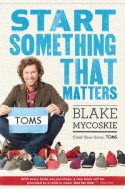 Love your work, work for what you love, and change the world—all at the same time.
Love your work, work for what you love, and change the world—all at the same time.
What matters most to you? Should you focus on earning a living, pursuing your passions, or devoting yourself to the causes that inspire you? The surprising truth is that you don’t have to choose—and that you’ll find more success if you don’t. That’s the breakthrough message of TOMS’ One for One movement. You don’t have to be rich to give back and you don’t have to retire to spend every day doing what you love. You can find profit, passion, and meaning all at once—right now.
In Start Something That Matters, Blake Mycoskie tells the story of TOMS, one of the fastest-growing shoe companies in the world, and combines it with lessons learned from such other innovative organizations as method, charity: water, FEED Projects, and TerraCycle. Blake presents the six simple keys for creating or transforming your own life and business, from discovering your core story to being resourceful without resources; from overcoming fear and doubt to incorporating giving into every aspect of your life. No matter what kind of change you’re considering, Start Something That Matters gives you the stories, ideas, and practical tips that can help you get started.
5. Startup Weekend: How to Take a Company From Concept to Creation in 54 Hours
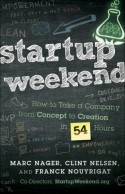 “Startup Weekend is a global phenomenon that has attracted and encouraged a new generation of entrepreneurs. Startup Weekend has changed the world, and this book will change the way you think about startups.”—David Cohen, founder and CEO of TechStars
“Startup Weekend is a global phenomenon that has attracted and encouraged a new generation of entrepreneurs. Startup Weekend has changed the world, and this book will change the way you think about startups.”—David Cohen, founder and CEO of TechStars
“Startup Weekend is the most current account of how the modern tech entrepreneur will operate and succeed. Sure, the person, the hustle, the persistence, and the environment all account toward success—but to hit your key fundamentals, this book will be the best.”—Brian Wong, founder and CEO of Kiip
“There are lots of people who want to be entrepreneurs but they don’t know how to get started. How do you move from passion and an idea to a team, a product, and a launch? Startup Weekend has empowered thousands of entrepreneurs around the world to kick-start their startup dreams. If you want to start a business, stop dreaming about it and just do it—this book can teach you how!”—Neil Patel, founder of Crazy Egg and KISSmetrics
“Startup Weekend is the modern-day equivalent of Woodstock for current and aspiring entrepreneurs.?It’s 54 hours of no-holds-barred company building that leaves pretty much everyone who participates saying ‘I can’t believe what we just built over a weekend!’ ?This book captures many of the insights and wisdom from those weekends and gives you a window into what is the mostintense entrepreneurial experience out there today.” —Greg Gottesman, Managing Director of Madrona Venture Group
6. The Thank You Economy – Gary Vaynerchuk
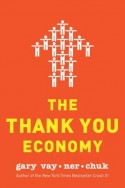 If this were 1923, this book would have been called “Why Radio Is Going to Change the Game” . . .
If this were 1923, this book would have been called “Why Radio Is Going to Change the Game” . . .
If it were 1995, it would be “Why Amazon Is Going to Take Over the Retailing World” . . .
The Thank You Economy is about something big, something greater than any single revolutionary platform. It isn’t some abstract concept or wacky business strategy—it’s real, and every one of us is doing business in it every day, whether we choose to recognize it or not. It’s the way we communicate, the way we buy and sell, the way businesses and consumers interact online and offline. The Internet, where the Thank You Economy was born, has given consumers back their voice, and the tremendous power of their opinions via social media means that companies and brands have to compete on a whole different level than they used to.
Here renowned entrepreneur Gary Vaynerchuk reveals how companies big and small can scale that kind of personal, one-on-one attention to their entire customer base, no matter how large, using the same social media platforms that carry consumer word of mouth. The Thank You Economy offers compelling, data-driven evidence that we have entered into an entirely new business era, one in which the companies that see the biggest returns won’t be the ones that can throw the most money at an advertising campaign, but will be those that can prove they care about their customers more than anyone else. The businesses and brands that harness the word-of-mouth power from social media, those that can shift their culture to be more customer-aware and fan-friendly, will pull away from the pack and profit in today’s markets.
7. Enchantment – Guy Kawasaki
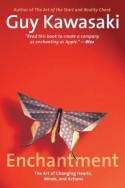 Enchantment, as defined by bestselling business guru Guy Kawasaki, is not about manipulating people. It transforms situations and relationships. It converts hostility into civility and civility into affinity. It changes the skeptics and cynics into the believers and the undecided into the loyal. Enchantment can happen during a retail transaction, a high-level corporate negotiation, or a Facebook update. And when done right, it’s more powerful than traditional persuasion, influence, or marketing techniques.
Enchantment, as defined by bestselling business guru Guy Kawasaki, is not about manipulating people. It transforms situations and relationships. It converts hostility into civility and civility into affinity. It changes the skeptics and cynics into the believers and the undecided into the loyal. Enchantment can happen during a retail transaction, a high-level corporate negotiation, or a Facebook update. And when done right, it’s more powerful than traditional persuasion, influence, or marketing techniques.
Kawasaki argues that in business and personal interactions, your goal is not merely to get what you want but to bring about a voluntary, enduring, and delightful change in other people. By enlisting their own goals and desires, by being likable and trustworthy, and by framing a cause that others can embrace, you can change hearts, minds, and actions.
This book explains all the tactics you need to prepare and launch an enchantment campaign; to get the most from both push and pull technologies; and to enchant your customers, your employees, and even your boss. It shows how enchantment can turn difficult decisions your way, at times when intangibles mean more than hard facts. It will help you overcome other people’s entrenched habits and defy the not-always-wise “wisdom of the crowd.”
Kawasaki’s lessons are drawn from his tenure at one of the most enchanting organizations of all time, Apple, as well as his decades of experience as an entrepreneur and venture capitalist. There are few people in the world more qualified to teach you how to enchant people.
As Kawasaki writes, “Want to change the world? Change caterpillars into butterflies? This takes more than run-of-the-mill relationships. You need to convince people to dream the same dream that you do.” That’s a big goal, but one that’s possible for all of us.
8. The Big Enough Company: Creating a Business That Works for You – Adelaide Lancaster & Amy Abrams
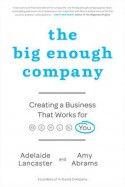 Despite the freedom that striking out on your own promises, most of the accepted wisdom on how to build a small business advocates a one- size-fits-all approach. So-called experts-and sometimes just well-meaning friends-urge business owners to grow fast, be more profitable, and imitate other successful start-ups. And while these tips may work for some, they fail to consider the astounding variety of values and motivations that individuals have for starting a business. Too often, owners sacrifice their personal satisfaction in order to conform to unnecessary (and often unworkable) standards.
Despite the freedom that striking out on your own promises, most of the accepted wisdom on how to build a small business advocates a one- size-fits-all approach. So-called experts-and sometimes just well-meaning friends-urge business owners to grow fast, be more profitable, and imitate other successful start-ups. And while these tips may work for some, they fail to consider the astounding variety of values and motivations that individuals have for starting a business. Too often, owners sacrifice their personal satisfaction in order to conform to unnecessary (and often unworkable) standards.
Adelaide Lancaster and Amy Abrams have seen this problem for years when working with women entrepreneurs like themselves. They set out to explore how successful female business owners have grown their enterprises in a way that sustains their own personal goals and needs, not someone else’s standards.
Drawing on the true stories of nearly 100 entrepreneurs, as well as their own experiences, Abrams and Lancaster guide readers through the best principles that really matter when you work for yourself. For instance:
- Figure out what’s in it for you: Clarify why you started your business and what you want to get out of it over the long haul.
- Find a role that suits your strengths: Identify where you add the most value and can have the most impact.
- Embrace experimentation: Trying new things gives you the opportunity to see what works and what doesn’t and opens up unseen possibilities.
This book empowers entrepreneurs to ignore popular “wisdom” and peer pressure to take charge of their businesses in a way that will help them succeed on their own terms.
9. Uncertainty: Turning Fear and Doubt into Fuel for Brilliance- Jonathan Fields
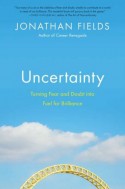 Properly understood and harnessed, fear and uncertainty can become fuel for creative genius rather than sources of pain, anxiety, and suffering. In business, art, and life, creating on a world-class level demands bold action and leaps of faith in the face of great uncertainty. But that uncertainty can lead to fear, anxiety, paralysis, and destruction. It can gut creativity and stifle innovation. It can keep you from taking the risks necessary to do great work and craft a deeply-rewarding life. And it can bring companies that rely on innovation grinding to a halt.
Properly understood and harnessed, fear and uncertainty can become fuel for creative genius rather than sources of pain, anxiety, and suffering. In business, art, and life, creating on a world-class level demands bold action and leaps of faith in the face of great uncertainty. But that uncertainty can lead to fear, anxiety, paralysis, and destruction. It can gut creativity and stifle innovation. It can keep you from taking the risks necessary to do great work and craft a deeply-rewarding life. And it can bring companies that rely on innovation grinding to a halt.
That is, unless you know how to use it to your advantage.
Fields draws on leading-edge technology, cognitive-science and ancient awareness-focusing techniques in a fresh, practical, non-dogmatic way. His approach enables creativity and productivity on an entirely different level and can turn the once-tortuous journey into a more enjoyable quest. Fields will reveal how to:
- Make changes to your workflow that unlock buried creative potential.
- Build “creation hives” — supportive groups that can supercharge and humanize the process.
- Tap social technology and user co-creation to add clarity, certainty, and sanity, even if you’re an artist or solo-creator.
- Develop a set of personal practices and mindset shifts that let you not just tolerate, but invite and even amplify, uncertainty as a catalyst for genius.
10. Nothing to Lose, Everything to Gain: How I Went from Gang Member to Multimillionaire Entrepreneur – Ryan Blair
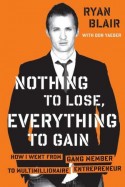 Ryan Blair knows about building a business from the ground up. Like many entrepreneurs he had no formal business education. But he had great survival instincts, tenacity, and above all, a “nothing to lose” mindset.
Ryan Blair knows about building a business from the ground up. Like many entrepreneurs he had no formal business education. But he had great survival instincts, tenacity, and above all, a “nothing to lose” mindset.
Blair’s middle-class childhood came to an abrupt end when his abusive father succumbed to drug addiction and abandoned the family. Blair and his mother moved to a dangerous neighborhood, and soon he was in and out of juvenile detention, joining a gang just to survive.
Then his mother fell in love with a successful entrepreneur who took Ryan under his wing. With his mentor’s help, Blair turned himself into a wildly successful businessman. He started his first company, 24/7 Tech, at the age of 21, and since then has started and sold several companies for hundreds of millions of dollars.
Now Blair shows readers how to start and grow their own profitable businesses by following his often contrarian philosophies:
• In juvenile detention, if you let someone take your milk the first day, they’ll start taking it every day. The same is true in business.
• When you’re dealing with an investor’s money, you have to act as if God himself wrote you the check.
• Most business plans aren’t worth the paper they’re written on.
• Efforts don’t pay the rent. Have no sympathy for employees who talk about how hard they’re trying.
• Entrepreneurship is great because you can set your own hours — any 17 hours of the day, 7 days a week. But if you’re doing what you love, it doesn’t drain you as much as the 9 to 5 death cycle.
This book is an inspirational guide for people who are willing to put in the hard work, time, and dedication needed to see their vision through to the end. Blair shares lessons from his mentors and advice from his own life- changing experiences, and provides readers with a road map for entrepreneurial success.


